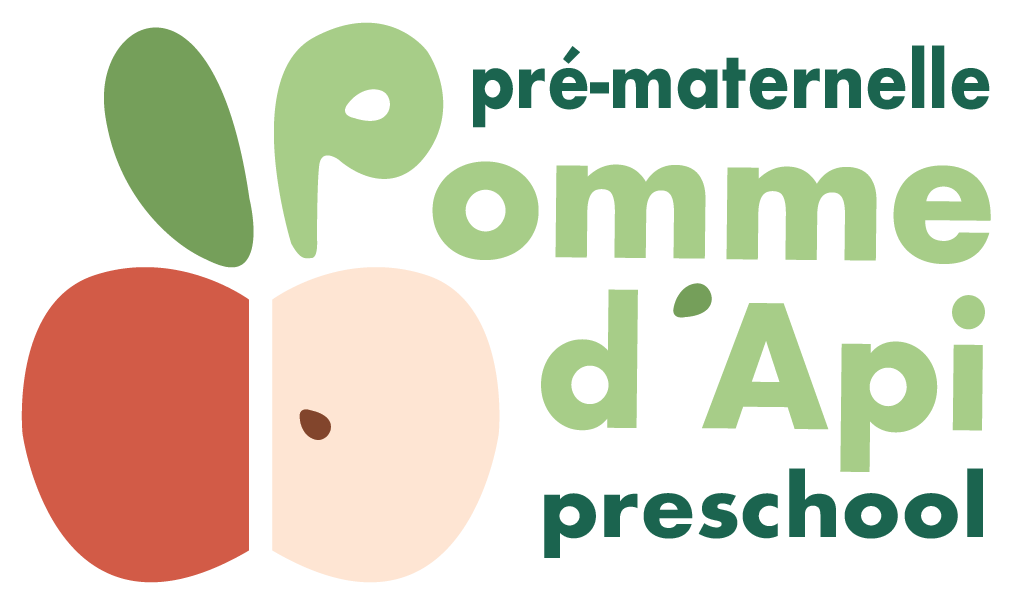Pomme d’Api offers three sets of Francophone/immersion classes that differ by schedule rather than by content. All classes are open to children from 32 months of age (as of the start of the school year) who are potty trained. Children can enrol in any set of classes, with a fixed schedule of 2, 3, or 5 days per week.
PRESCHOOL PROGRAM (MORNINGS)
2-Day Morning Class
Tuesday & Thursday
9 a.m. to 12 noon
3-Day Morning Class
Monday, Wednesday, Friday
9 a.m. to 12 noon
5-Day Morning Class
Monday to Friday
9 a.m. to 12 noon
*We acknowledge that for parents dropping siblings off at school at 9 a.m., it is difficult to be on time. The first 15 minutes of the morning class constitute a grace period of welcoming the children into the classroom for free play.
PRESCHOOL AND KINDER-PREP PROGRAM (AFTERNOONS)
2-Day Afternoon Class
Monday & Wednesday or Tuesday & Thursday
1 p.m. to 4 p.m.
4-Day Afternoon Class
Monday to Thursday
1 p.m. to 4 p.m.
In the afternoons, we offer a specialized Kindergarten Preparation program for children aged 2.5 to school age, featuring a structured one-hour daily session of kinder-prep and two hours of play-based learning. This class supports children in their transition to kindergarten by honing essential academic skills, such as writing, shapes, numbers, and more. While this class is typically for older children who no longer require an afternoon nap, younger children are warmly welcomed, with activities adapted to their developmental stage for a gradual introduction to kindergarten readiness.
To accommodate every child’s developmental stage, there will be separate play-based activities facilitated by another teacher during kinder-prep time, ensuring that every child’s needs are met. Our commitment is to provide a holistic learning experience preparing children for success in kindergarten and beyond.
French in the Classroom
Throughout the preschool year, French is used in the classroom, and children are exposed to the language according to their individual needs and abilities. Some children will already understand or speak some French when they start school, and some come from Francophone families. Some will come from Anglophone families with no experience of speaking French at home.
We incorporate French in class through the repetition of phrases and expressions during our routines. From the start, we sing our transitions in French, and French songs will be sung at circle time over and over again. A child who has no prior mastery of the language will be gradually introduced to French, whereas a child from a Francophone family will be addressed by teachers solely in French.
As such, all children in the classroom will be continuously exposed to French when spoken to them or around them. We want all students to feel comfortable and understood at school, whether they are new to French or fluent.
Children need both structure and flexibility in order to develop a positive attitude towards the French language. Therefore, we provide structure, but remain flexible based on the children’s needs, language levels, and learning styles. The teachers do not point out language mistakes to avoid discouraging the children and hindering their spontaneity. Instead, the teachers rephrase the children’s statements in a supportive and positive manner.
There are two basic steps for teaching French in our programs:
Step 1: Establish trust. At the beginning of the school year, we concentrate on welcoming the children as individuals and establishing a solid foundation of trust and friendship. French is introduced gradually. Individual interactions with Francophone children are conducted in French as much as possible.
Step 2: Increase the use of French. As children become comfortable in the preschool setting, we increase the use of French and decrease the use of English, with the ultimate goal of English being used only when dealing with matters of safety or discipline. The language is kept simple yet challenging, and is adapted according to the maturity of the children.


